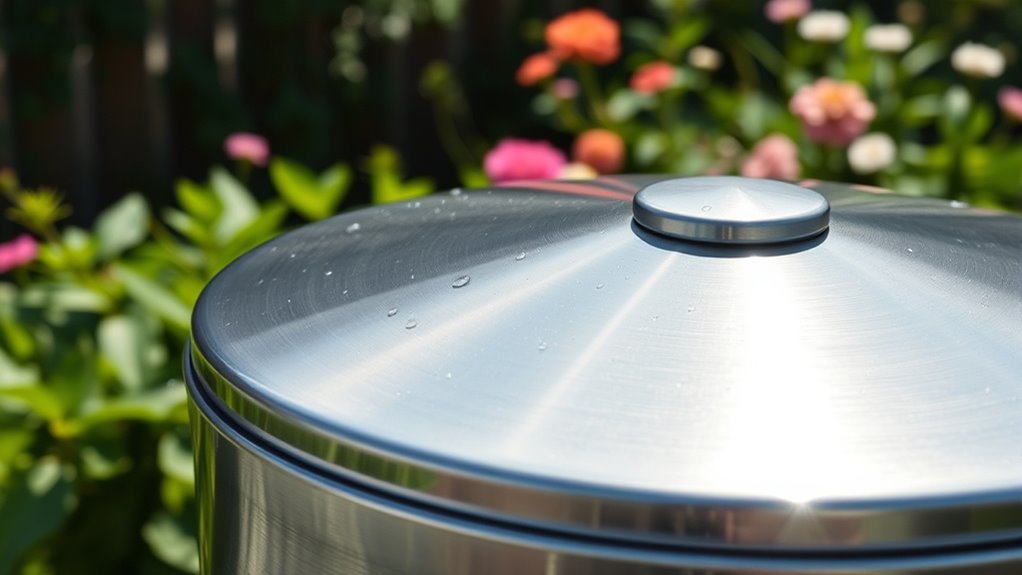To control odors in your compost bin, balance greens and browns, turning often to aerate the pile and prevent anaerobic conditions. Keep the bin covered tightly to contain smells and pests, and monitor moisture levels to avoid sogginess or dryness. Incorporate odor-absorbing additives like baking soda or activated charcoal when needed. Maintaining these practices consistently will keep your compost smelling fresh, and if you follow these tips closely, you’ll discover even more ways to keep odors at bay.
Key Takeaways
- Maintain proper moisture and aerate the compost by turning regularly to prevent foul odors.
- Balance green (wet) and brown (dry) materials to avoid excess moisture and nitrogen buildup.
- Cover the compost bin securely with a tight-fitting lid to contain smells and deter pests.
- Add odor-absorbing materials like activated charcoal or baking soda to neutralize unpleasant smells.
- Keep the compost loose, well-aerated, and properly managed for efficient decomposition and odor prevention.
Balance Browns and Greens
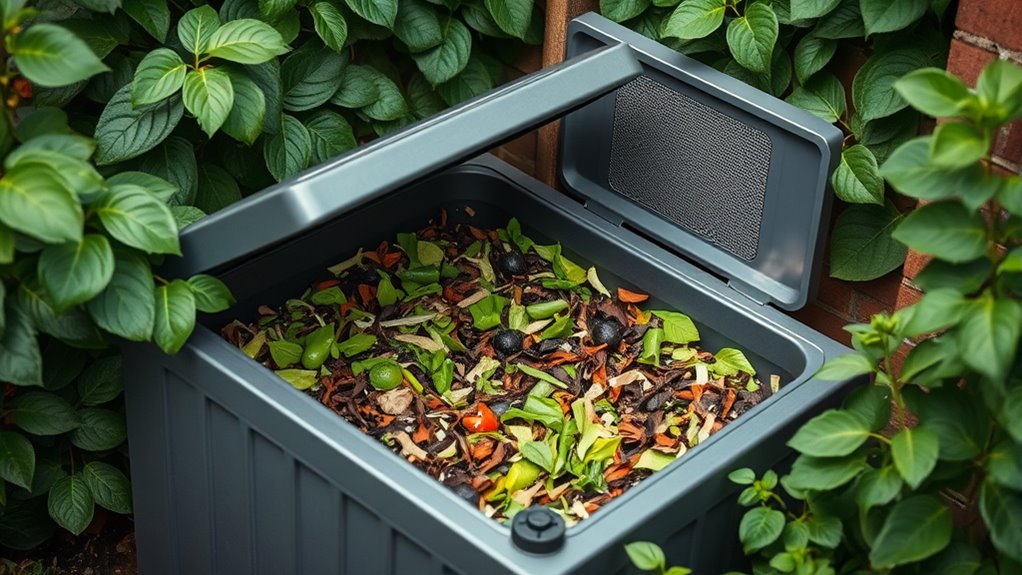
Balancing browns and greens is key to controlling odors in your compost bin. Browns include dry leaves, straw, paper, and cardboard, providing carbon that helps absorb moisture and reduce smell. Greens consist of fresh grass clippings, fruit and vegetable scraps, and coffee grounds, offering nitrogen that fuels composting. Too many greens can produce a strong, foul odor due to excess moisture and nitrogen, while too many browns can slow down the composting process. To keep things balanced, add browns in roughly a 2:1 ratio of browns to greens. Mix them thoroughly so that moisture and aeration are evenly distributed. This balance not only minimizes odors but also promotes healthy decomposition, turning your waste into rich compost efficiently. Incorporating proper composting techniques ensures optimal decomposition and odor control.
Maintain Proper Aeration

Proper aeration is essential for controlling odors in your compost bin because it allows air to circulate and prevents the buildup of unpleasant smells. When your compost lacks airflow, anaerobic bacteria thrive, producing foul odors. To maintain proper aeration, turn your compost regularly and avoid packing it too tightly. Adding coarse materials like twigs or straw helps create air pockets, improving airflow. Use the table below for quick ideas:
| Method | Benefit |
|---|---|
| Turning the pile | Distributes oxygen evenly |
| Adding brown materials | Enhances air pockets |
| Using a compost aerator | Simplifies turning process |
Consistent aeration keeps your compost fresh-smelling and decomposition efficient. Additionally, monitoring temperature and moisture levels can help maintain optimal conditions for composting.
Use Odor-Absorbing Additives
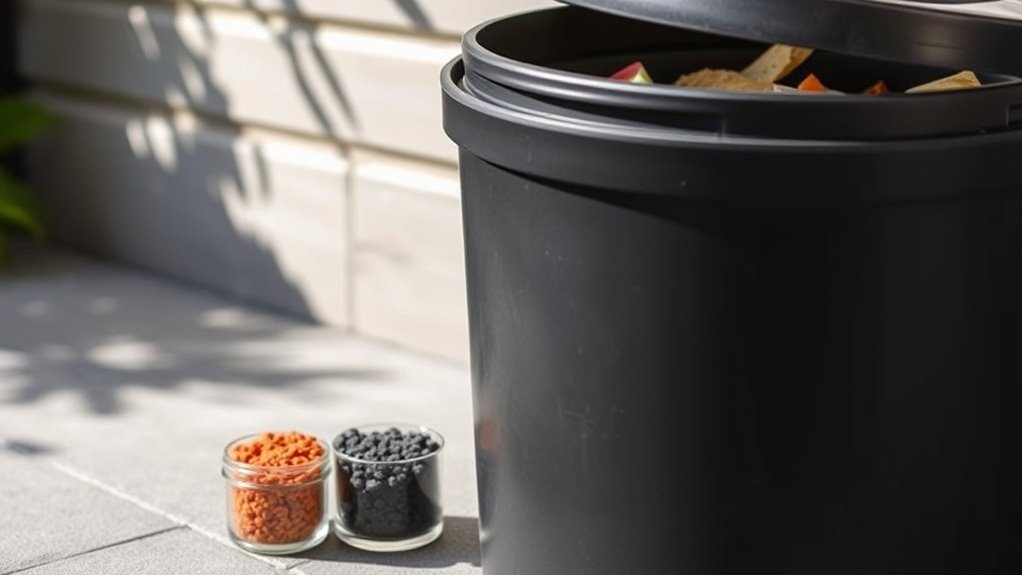
Using odor-absorbing additives is an effective way to keep your compost bin smelling fresh. These additives help neutralize unpleasant odors by capturing or breaking down odor molecules. Common options include activated charcoal, baking soda, or commercial compost starters designed for odor control. To use them, sprinkle a layer at the bottom of your bin or mix them into the compost pile regularly. Activated charcoal is especially effective at absorbing odors without affecting decomposition. Baking soda is a budget-friendly alternative that can be added during bin maintenance. Always follow the product instructions for best results. Incorporating these additives can markedly reduce foul smells, making it more pleasant to maintain your compost bin. Effective odor control can also be achieved by maintaining good aeration and a proper balance of greens and browns.
Keep the Bin Covered
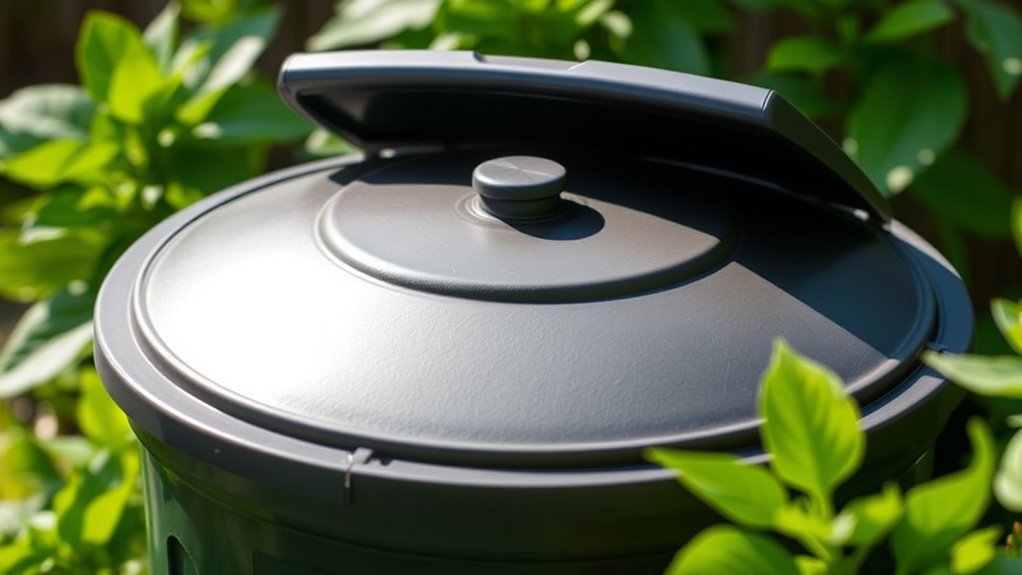
Keeping your compost bin covered is key to controlling odors. Make sure you use a tight lid, secure it properly, and replace any damaged covers. Doing so helps contain smells and keeps pests away. Additionally, maintaining proper odor control practices can further reduce unpleasant smells.
Use a Tight Lid
A tight lid on your compost bin is essential for controlling odors and preventing pests. It keeps smells contained and discourages animals from rummaging through your compost. Ensuring the lid fits snugly is key; a loose lid can let odors escape and invite unwanted visitors. Check for gaps or cracks regularly and replace or repair as needed. To help you maintain a secure seal, consider the following options:
| Lid Type | Benefits |
|---|---|
| Rubber Gasket | Creates an airtight seal |
| Locking Clips | Prevents accidental openings |
| Heavy-Duty Lid | Adds weight to keep it closed |
Proper lids also contribute to a more efficient composting process by maintaining optimal internal conditions.
Secure the Cover Properly
Ensuring your compost bin is properly covered is essential for effective odor control. A secure lid prevents unpleasant smells from escaping and keeps pests out. Make sure the cover fits snugly over the bin, without gaps or loose edges. Check that latches or fasteners are engaged firmly, especially after adding new waste. If your lid has hinges or clips, ensure they are functioning correctly. Properly securing the cover creates a barrier that contains odors and keeps moisture inside, which is crucial for composting. Regularly inspect the cover to confirm it remains tight, especially after windy days or heavy rain. Additionally, verifying that the compost area adheres to safety standards for pest prevention helps ensure a safe and odor-free environment. A well-secured lid not only controls odor but also helps maintain the right environment for compost decomposition.
Replace Damaged Covers
If your compost bin’s cover is cracked, torn, or warped, it’s time to replace it to maintain effective odor control. Damaged covers can allow odors to escape and pests to get in, defeating your efforts to keep things smelling fresh. Choose a sturdy, well-fitting cover made from durable materials like heavy-duty plastic or metal. Before replacing, clean the existing cover and bin to remove debris and mold. Fit the new cover securely, ensuring there are no gaps or loose areas. A proper seal is essential for controlling odors and keeping pests out. Regularly inspect your cover for damage, and don’t hesitate to replace it if it shows signs of wear. Keeping your compost bin covered helps manage odors and promotes a cleaner, more efficient composting process. Additionally, digital literacy programs encourage playful communication among seniors, which can foster a sense of community and reduce feelings of isolation.
Manage Moisture Levels
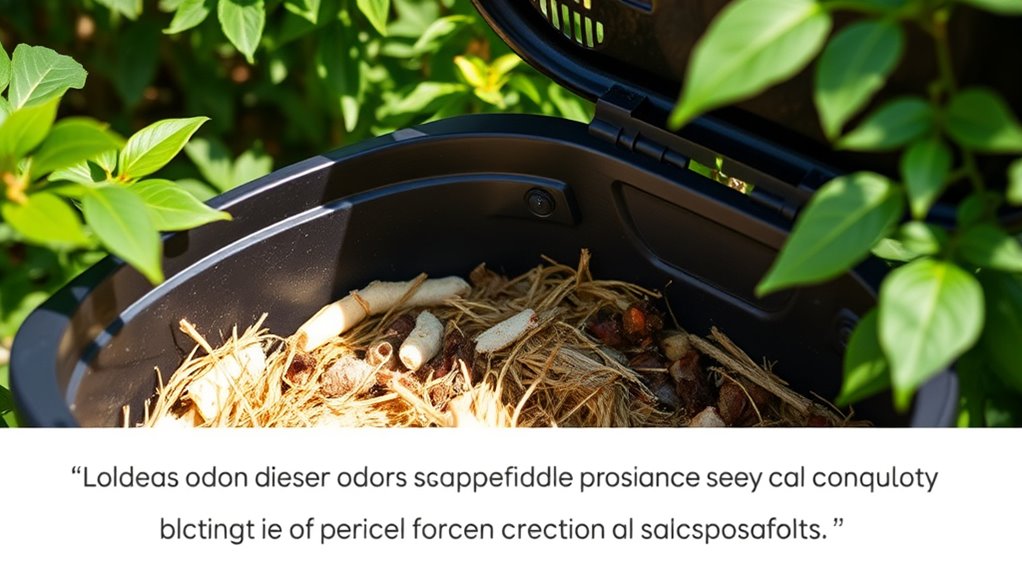
You need to keep your compost moist but not soaked. Use water sparingly to avoid creating a soggy environment that causes odors. Regularly check moisture levels and adjust to maintain a balanced, healthy compost. Incorporating proper AI monitoring techniques can also help optimize moisture management for better compost health.
Keep Compost Moisture Balanced
Maintaining the right moisture level is essential for preventing odors and promoting healthy composting. When your compost is too wet, it creates a soggy environment that smells and attracts pests. Conversely, if it’s too dry, decomposition slows down. To keep things balanced, consider these tips:
- Regularly check moisture by squeezing a handful—if it feels like a damp sponge, you’re good.
- Add dry materials like leaves or shredded paper if it’s too wet.
- Mist with water or add green waste if it’s too dry.
- Cover your compost to regulate moisture and prevent excess evaporation.
- Proper moisture levels help optimize microbial activity and prevent unwanted odors.
Use Water Sparingly
While keeping compost moist is important, using water sparingly prevents over-saturation that causes odors and attracts pests. Too much water creates a soggy environment, slowing decomposition and encouraging bacteria that produce foul smells. To avoid this, add water in small amounts and mix the compost thoroughly. Check the moisture level regularly: it should feel like a damp sponge—not dripping wet or bone dry. If excess water accumulates, turn the pile to aerate it and allow excess moisture to evaporate. Remember, maintaining the right moisture balance is key to controlling odors and promoting healthy composting. Ensuring proper moisture levels is essential for efficient composting and odor control. By using water cautiously, you keep your compost bin odor-free and ensure efficient decomposition without attracting unwanted pests.
Regularly Turn and Mix Compost
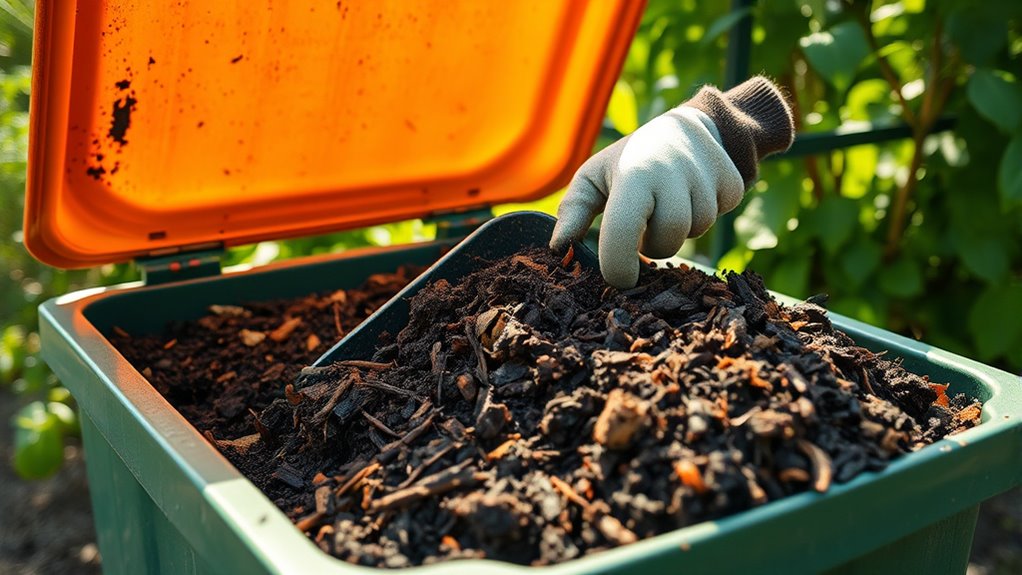
Turning and mixing your compost regularly is essential for controlling odors and speeding up decomposition. It prevents unpleasant smells by aerating the pile and evenly distributing moisture. By doing this, you also break up compacted materials, which helps microorganisms work more efficiently. Here’s what you should do:
- Use a pitchfork or compost turner to flip the pile every 1-2 weeks.
- Ensure the mix includes both green (wet) and brown (dry) materials for balance.
- Check moisture levels—add water if it feels dry, but avoid making it soggy.
- Keep the pile loose, avoiding dense clumps that trap odors.
Regular turning keeps the compost fresh-smelling while speeding up the process, turning waste into rich soil faster.
Frequently Asked Questions
How Long Does It Take to Eliminate Compost Bin Odors Completely?
You might wonder how long it takes to eliminate compost bin odors completely. It varies based on factors like bin size, materials, and maintenance. Usually, if you regularly mix, add carbon-rich materials, and keep it moist, odors diminish within a few days to a week. Consistent care speeds up the process, so with proper management, you can considerably reduce or eliminate unpleasant smells in just a short time.
Are There Natural Remedies for Severe Compost Odors?
Sure, because who wouldn’t love a compost bin that smells like a rose garden? If you’re battling severe odors naturally, try adding a splash of vinegar or baking soda—those kitchen staples work wonders. Also, mixing in some shredded newspaper or dry leaves absorbs excess moisture and odors. Turning your compost regularly helps too. These simple, natural remedies might just turn your bin from a stinky mess into a fragrant, eco-friendly treasure.
Can Certain Food Scraps Cause More Odor Than Others?
Certain food scraps definitely cause more odor than others in your compost bin. For example, meat, dairy, and oily foods tend to produce strong, unpleasant smells because they break down slowly and attract pests. On the other hand, fruit and vegetable scraps usually decompose faster and smell less. To keep odors in check, balance your compost with browns like leaves or paper and avoid adding too much of the smelly stuff at once.
How Do Temperature Fluctuations Affect Compost Odor Control?
Temperature fluctuations impact compost odor control because they influence microbial activity. When it gets too cold, microbes slow down, leading to incomplete decomposition and stronger odors. Conversely, high temperatures boost microbial activity, helping break down waste faster and reducing smell. To manage this, you should insulate your compost bin during cold spells and avoid overheating in hot weather. Consistent temperatures help keep odors in check and your compost healthy.
Is It Safe to Use Commercial Odor Neutralizers in Compost Bins?
You might wonder if it’s safe to use commercial odor neutralizers in your compost bin. While some products are designed for compost use, many contain chemicals that could disrupt the natural decomposition process or harm beneficial microbes. It’s best to read labels carefully and opt for natural alternatives like baking soda or activated charcoal. Always avoid harsh chemicals to keep your compost healthy and safe for the environment.
Conclusion
Controlling compost bin odors is all about balance and maintenance. By balancing browns and greens, maintaining proper aeration, and managing moisture, you can markedly reduce unpleasant smells. Some believe adding charcoal or bacteria boosts odor control, but recent studies suggest these methods work best when combined with proper bin management. Regular turning and covering your compost create an environment that discourages odors naturally. With consistent care, you can keep your compost bin smelling fresh and functioning efficiently.
